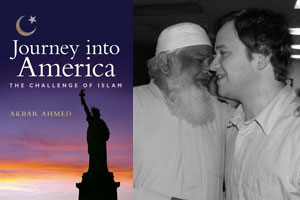Alumni
Martin ’06 Explores Muslim America: 100 Mosques, 75 Cities, 365 Days

Frankie Martin, CAS/BA ’06, visiting a mosque in Austin, Texas.
Traveling by plane, train, car, even boat, research fellow Frankie Martin, CAS/BA ’06, knew he was in for a ride, but talk about a trip! “I learned so much about America,” Martin says, “I saw my own country through new eyes.”
As a research assistant to SIS Professor and Ibn Khaldun Chair of Islamic Studies Akbar Ahmed, Martin travelled across America from fall 2008 to fall 2009, visiting 100 mosques in 75 cities for the book, Journey Into America: The Challenge of Islam, published by Brookings Institution Press on June 15, 2010.
“We were received with hospitality. Often, we heard ‘Thank you, we really want to be heard and get our story out there,’” he says. “Many said that America is the best place to be a Muslim,” noting that “our founding fathers believed in religious freedom.“
An estimated seven million Muslims live in the United States today. “They are as American as anyone else,” Martin says.
In order to shed light on this rapidly growing population, Martin, Ahmed, and a team of five students organized events, conducted interviews, and collected 2,000 questionnaires. They asked questions like: What does it mean to be American? What does it mean to fit in? How can a Muslim become fully accepted as an American? “We want to provide an accurate picture of the Muslim community in America, clear up misconceptions, and improve relations between Muslims and non-Muslims.”
The biggest surprise, he says, was witnessing the true diversity of America. In conducting the most comprehensive study to date on the Muslim American community, they also visited with the Jewish, Christian, Mormon, and Native American communities. From New York City to Salt Lake City, Las Vegas to Miami, from the largest mosque in America in Dearborn, Mich. to the oldest mosque in America in Cedar Rapids, Iowa (designated in 1934), they spoke with and observed thousands of people expressing their faith.
“After 9/11, it’s more important than ever that we understand each other,” he says.“Reaching out to members of other faiths has always been important to me,” says Martin, who grew up in the Baltimore, Md. suburbs as part of the Episcopal Church. “But I was inspired traveling with Professor Ahmed and doing so much research to learn how deeply religious pluralism is entrenched in the Founding Fathers' definition of what it means to be American. The Founding Fathers were inspired by Christian thinkers like John Locke, who wrote that the true Christian's duty was to ‘practice charity, meekness, and good-will in general towards all mankind, even to those that are not Christians.’”
As the Muslim holiday Ramadan begins on August 10, Martin suggests getting to know your local Muslim community, interacting within it, and having an open mind in order to learn more. Ramadan, for example, is “a very important month in Islam, where Muslims refrain from eating morning ‘til night, to show devotion to God and to empathize with those who are not as fortunate. They have a feast every day, once the sun goes down,” he says.
This is Martin’s second book with Professor Ahmed. The first, Journey Into Islam: The Crisis of Globalization (Brookings, 2007) was also large in scope, in which they visited Muslim nations in the Middle East, South Asia, and Far East Asia. Both tours attempted to shatter often similar stereotypes many in the U.S. and Muslim world have of one another as dangerous and violent—and to build bridges of understanding. Martin notes it’s necessary, given that “one out of every four people on the planet is Muslim.”
This time, as they zig-zagged across America, a documentary was filmed at the same time. The U.S. Department of State is currently in the process of translating the documentary into Arabic. It’s another way to document the ever-evolving American identity.
Martin sums up their journey with a story. “Driving through Ft. Myers, Fla., we thought, ‘Let’s just stop and ask someone what they think about Islam and Muslim Americans.” After they explained their current project and previous travels in Muslim countries to one elderly woman, she responded, “Do they love their children?”
“Yes, of course,” they said.
She smiled and said, “I just knew it!” Her question was really a comment all along.
And he knew that she had just validated the purpose of their work: Humanizing one group to the other.

